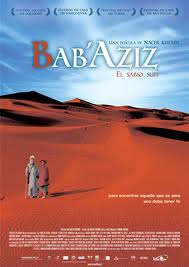
BAB ‘AZIZ
Iran, 2004, 98 minutes, Colour.
Directed by Naser Khamir.
Bab ‘Aziz is a beautiful film to watch. The Tunisian director brings the perspective of 1001 Nights to a religious pilgrimage which is both eternal through the deserts of Iran as well as contemporary with motorcycles, cars, modern towns.
The focus is on an elderly wise man, blind, accompanying his granddaughter to a council of dervishes. On the way, they experience a thief, a criminal, a modern poet. They also sing, dance and the wise man tells stories, especially about the life of a prince who gives up all his wealth after an enlightened vigil and becomes a wise man himself. It emerges at the end that Aziz is the prince. His granddaughter delights in these stories.
The film is based on Sufi interpretations of Islamic tradition and faith. It is the possibility – even though difficult for western audiences to understand fully – the perspective of deep-felt faith and profound mysticism in Islam.
1. An Iranian perspective on faith, religion, myths and legends? The traditions of Islam? As interpreted by a Tunisian director?
2. The Tunisian perspective, the director’s writing on 1001 Nights, his using this kind of storytelling?
3. The film as a road movie, modern, eternal? The musical score?
4. The range of poems, songs, dancing? Themes of love, the soul, death and eternity?
5. The portrait of Aziz, his age, blind, the wise man, wanting to go to the Dervish Festival, not knowing where it was being held, trusting, his love for Ishtar, the bond of family, his instructing her? The travels together, the detail, the sand and the locations in the desert, food and drink? His telling her the story of the prince, the symbol of the gazelle, the thief and his taking the pack, meeting the pilgrim poet, going into the town, Osman and his death sentence, his telling his story? Their being lost, Ishtar going by herself, her being found, the poet bringing her back, journeying together, her wanting him to finish the story, his bequeathing his wisdom to her? His dying? His being the prince?
6. Ishtar, her age, her grandfather, her vivacity, delighting in being with him, finding the food, showing him the way, sharing things with him? The details of the pilgrimage? Listening to the stories? The thief, Osman, going out into the desert, being found, her illness, recovery, continued the journey, the end of the story, her going on to the meeting?
7. The picture of the thief, taking the knapsack and going on the bike? Osman, his story, the modern tone, the irony of his twin brother, his leaving?
8. The portrait of the poet, his story, the conference and the poets reading their work, in the desert, the disciple of Aziz, the bequest to him?
9. The thief who travelled with Hassein, friendliness, Hassein bathing, his stealing everything, Hassein running out into the desert, finding Ishtar, with Aziz at the end?
10. The cumulative effect of the stories, the pilgrimage, the landscapes of the desert, food and drink, poetry and song? The role of symbols, the prince and his wealth, his story, his vigil, the gazelle, his being transformed into a wise man? The scenes with the dervishes, their dances? Sin and redemption, eternity and wisdom?